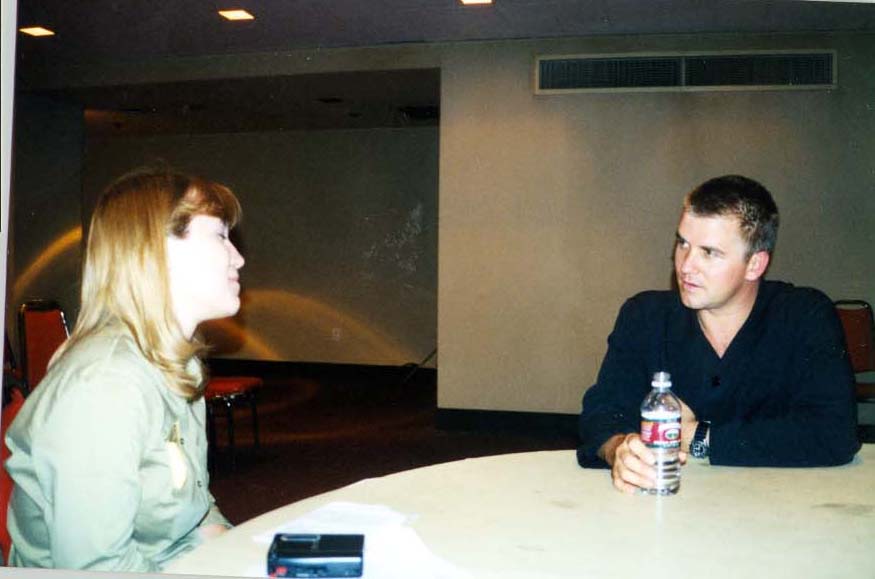
Jeremy was kind enough to meet with me directly after his stage appearance. With a little help from my friend, Rachel, I had a very nice discussion with Jeremy. He is a very nice man. Here is most of the interview. I have a bit more to transcribe. I promise to finish soon, but for now, enjoy this much.
Thanks to Rachel for taking pictures during the interview. Click on the thumbnail to get the big picture.

After a brief discussion of how nervous he had been on stage, we began.
K: Congratulations on your new son.
J: Thank you.
K: What's his name?
J: Hugo Manny.
K: Is he named after anyone?
J: Victor Hugo.
K: Is there anything you would like the fans to know? Any statistics you're willing to share? Like your birthday?
J: 27 July 1967 (NOTE: Jeremy's reply was faint on my recorder, so this may not be exactly correct. If anyone knows differently, please let me know.)
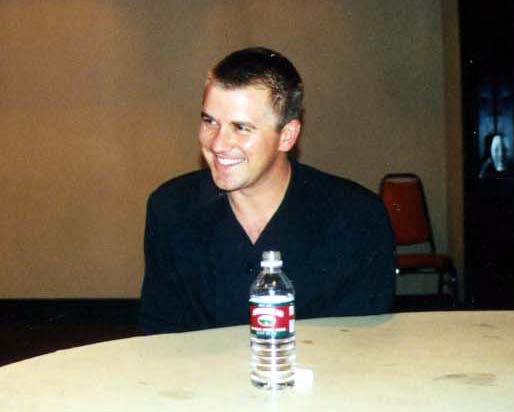
K: [On stage] you talked about how New Zealand and Australia are really different. I've noticed that the NZ actors are not used to all this attention. Is it like that in Australia? Do you have that tall poppy syndrome, or is it like here where celebrities are a big deal?
J: It's sort of between the two. The tall poppy syndrome still exists but, particularly in the last few years, I call ? the L.A. of the ? in Sydney, we're getting there. The movie industry is a massive industry in Sydney. We've got the Fox studios; a lot of American productions come down for shoots. We're getting more and more used to seeing big spotlights in the sky, the social pages are just getting bigger and bigger and bigger, there's more movement of talent, not only actors, but directors and other professionals between L.A. and Sydney. But I wouldn't say we're further down the line than NZ. International films have been being made in NZ for years.
K: Yes, I've seen a few. I know they make it a big deal about not giving the attention to celebrities that I guess America does.
J: Well, I don't think anyone gives attention to celebrities like America does [laughs]. But that's one of the great things about coming here today - experiencing... it's an important skill to know how to deal with that. I'm very flattered to have been asked.
K: Are you thinking about coming over here to look for work?
J: It's always been something I've talked about. Making the move is not going to be easy because I don't have a green card, to begin with, and agents and talent scouts don't really want to have to deal with that, so you've got to sort that part of your life out first. If I can get a big break in Australia, I might... I mean, this is the market, this is the market I want to be in. I've had a number of offers to be in small action sets, but I just want to bide my time and come out with something big under my belt.
K: You talked about that you were going to be producing Hurly Burly. Are you going to be acting in it as well?
J: I don't think so. I thought about it to begin with, but it's too big a play.
K: Have you ever performed in Hurly Burly?
J: No. I would really like to because it's such a good play. One of the reasons I want to do it is because I'm moving into directing, so I thought it'd be great to get to direct. So I better just concentrate on directing.
K: I was going to ask you if you were interested in directing. I guess you are.
J: Yes.
K: Just plays, or television and movies, too?
J: Television and movies as well. I think it's a natural progression, especially when you've been around. I mean, I've been doing it for 15 years. You learn so many skills, it just seems silly not to take those skills further.
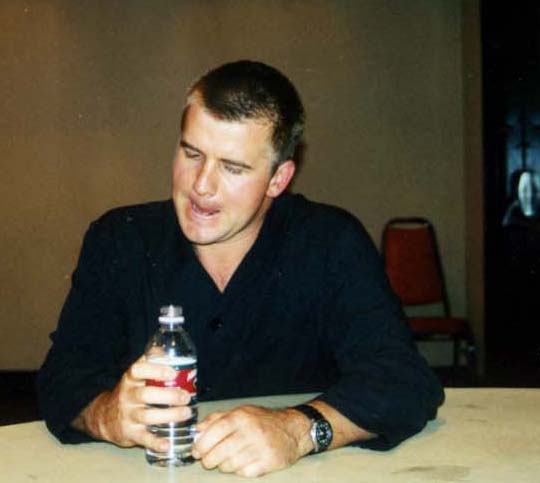
K: I was pretty disappointed when Pompey got killed.
J: Yeah. You were disappointed? <laughs>
K: [End Game] was a good episode, but we were disappointed. Did you have a favorite Pompey episode? Was it the first one?
J: Yeah, the first one. When in Rome. Because I got to play more in that episode than in any other episode. I've got to say, I was pretty disappointed with the other two episodes after that. I still feel like I had much more left to play.
K: I loved that scene with you in A Good Day. In that scene in the cave, with Xena and Caesar. That was probably one of my favorite scenes.
J: I've never seen that.
K: You know that scene where she is supposed to be flipping off your chest and you're supposed to be reacting? It was perfect. It was wonderful. I loved it.
J: Well, great.
K: Pompey was very a flamboyant character. Was that the intent?
J: Yeah. 'Cause, you know, you think of Rome, you think of indulgence. I do. All that era, in Roman history anyway. So I thought, "that's where I'm going to take it." This guy's a hedonist. My big disappointment is Palaemon. I loved that character.
K: They should've brought him back. That would've been great.
J: Oh yeah. Yeah. But, what can I say.
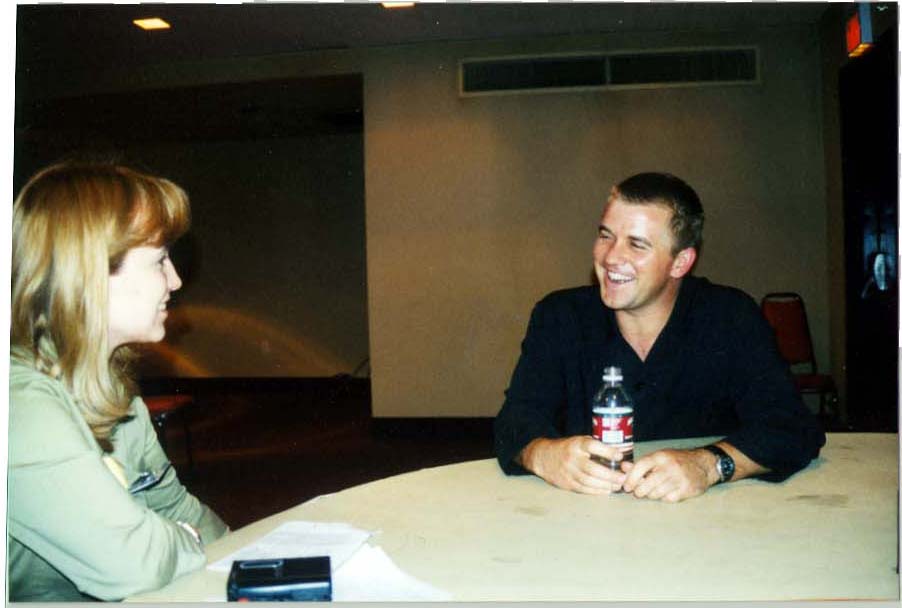
K: Is this your first time to the states?
J: No, it's my probably fourth time. This is my second time to L.A. I have some friends here... More and more people are coming here to live, so...
K: Do you like it here in L.A.?
J: Yeah, it's good, it's good. Life's pretty easy here. And the business, it's the best.
K: I'd love to visit Australia someday. I've been to NZ, but not to Australia even though we were so close.
J: Yeah, you should come to Sydney, it's an awesome town.
K: Is that where you live now?
J: Yeah. It's just so beautiful. It has this harbor.
K: They advertise a lot over here.
[Paul Hogan's name came up in regard to tourism. Jeremy recounts a recent meeting with him.]
J: I went to a dinner with him recently. It was a tribute 'cause he'd been working for the tourism task force... He did so much with that series of ads. They had this dinner in honor of him. It was great to meet him. He's an exceptional man.
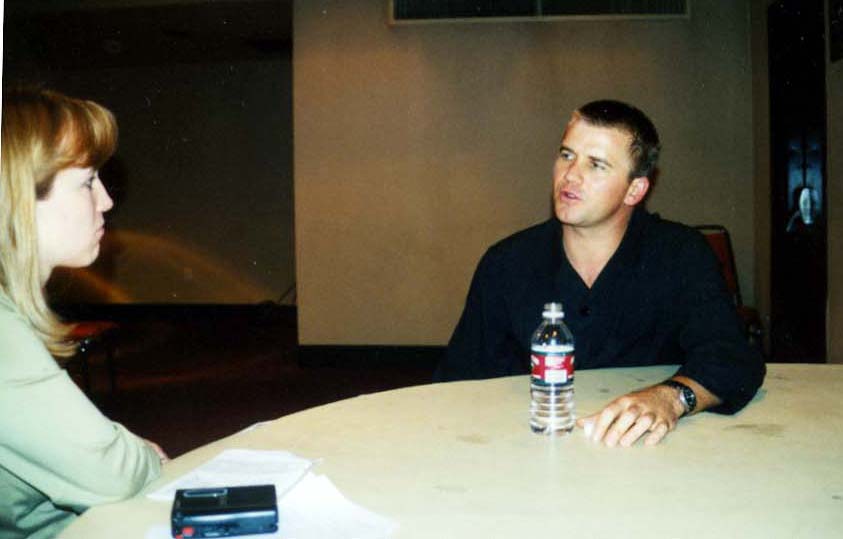
R: You've done a lot of theater, too, haven't you?
J: Yeah, my whole background's in theater. I'd worked in the theater for probably three years before I went to drama school. And then I had three years of drama school. But I haven't done a lot of theater since I graduated. I'm not sure, it's just like a natural thing to get pushed into screen and television and for some reason I'm getting ignored.
R: Which medium do you prefer?
J: That's a classic question, but to me, they're two completely different things. Like I said, live performance - there's nothing like it. 'Cause it's a true interaction between two bodies - the audience and the people on stage.
Things can happen that have never happened at any other time because you're actively involved in the...
And film - you can play with it so much.
K: How old were you when you started acting?
J: I was probably like 14. And I did Fiddler on the Roof.
K: What part did you play?
J: The young guy the girl from the family falls in love with. I forget his name... that Yentil falls in love with. Was it Yentil? And I have this love affair and I sing a duet. And then I did a couple of onscreen shows. At University I studied Communications and... I started doing some units in theater. I guess the formative moment for me was doing Shakespeare's The Tempest. I played Ferdinad. We took this production to Southwest Asia and it's full of Southwest Asian mythology and magic. We performed it in ways that those people could really understand it, like we adopted their mythology, and used their mythology to tell the story. To me, that was one of the best theatrical experiences of my life, because it was on that tour I really said there's so much magic on the stage. This is a job, this is what I want to do. I went back and did some more plays and eventually I said to myself, "well, if I'm gonna do it, I better do it properly." So I went to drama school. It was hard to do that because it was almost like taking a step backwards - to come out of the profession and go to drama school, but it was something I had to do.
K: Do you think it helped?
J: It really helped. That was what enabled me to go to Sydney. Sydney is where the market is in Australia. I lived in Perth, which is on the other side of the country, it's three thousand miles. Graduating from drama school is what brought me to Sydney. And Sydney is what's bringing me here.
K: What did you think of your first convention experience?
J: It's a blast. It's like... you're like a Rolling Stone.
K: You're doing the cabaret tonight, aren't you?
J: Yeah, if I can learn my songs.
K: So, you're a singer, too?
J: I don't normally sing.
K: Do you play an instrument?
J: No.
K: So, you're just going to go out there and have fun?
J: Yeah, try. Get over my nerves.
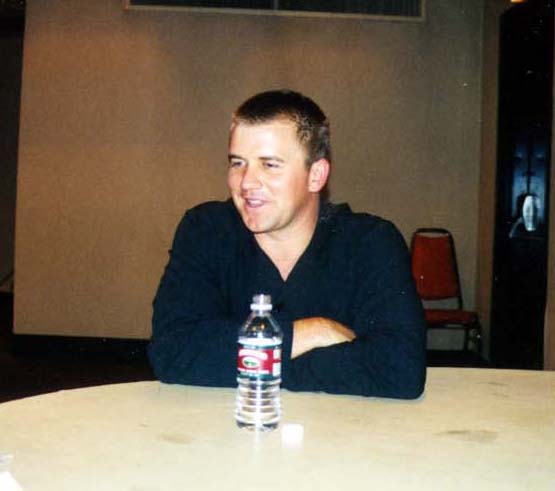
K: So, do you actually watch the show? I got the impression that you did.
J: Yeah, I do.
K: Some of the actors, I guess don't watch.
J: I like it.
K: Do you like watching yourself?
J: When it's good. When it's good, it's good. When it's bad, it's really bad.
R: You liked Palaemon as well?
J: Like I said, that's the most fun I've ever had in a role.
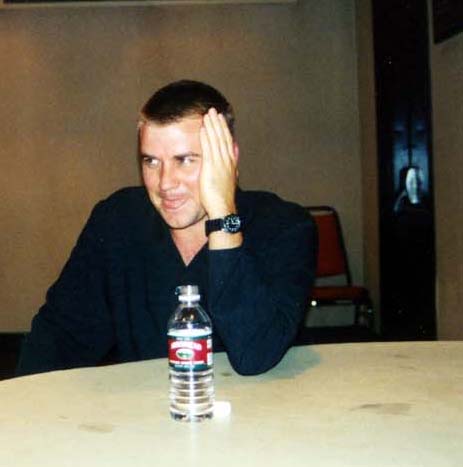
K: I saw you as Pollux on Young Hercules and hardly recognized you. Did you work out and bulk up for that role?
J: Yeah, I read that on a page, was that you that wrote that?
[We have a short discussion as to whether that comment was made on my page or not. Embarrassingly enough, it was.]
J: Well, the truth is that I just spent two months in France.
K: Oh, vacation will do that.
J: I'm eating this cheese and drinking this wine, and the whole time I'm thinking, "I've got to stop this," you know, because I'm flying straight to New Zealand to do this new role. And halfway through I thought, why bother it'll be fine.
I feel it worked well. There's Jason, and he's so big, and my brother was so small and I was an Olympiad, and I sort of feel it really worked well.
I get there and they go, "You are going to do this without a shirt," and I think, "Oh no, all that cheese, all that cheese in my waist." So you can write that on your chat page.
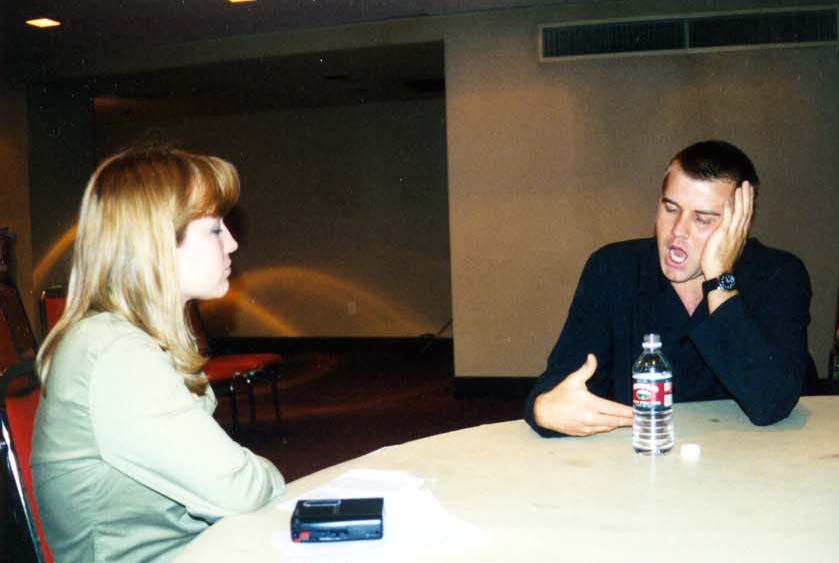
K: Does it embarrass you to have people make pages for you?
J: No, it thrills me stupid. It's really flattering.
You can't be in this business without...
K: You want to have fans.
J: Exactly. Exactly. We wouldn't be here if it wasn't for you. And it's fantastic to have feedback about your work.
K: [comments on him being able to say there is a web page out there on him]
J: I hope the writers at Xena see it. I do think there is that feeling that they like to use the same actors again and again. And the fans do like it.
K: And it's great how different you look from role to role.
J: That's one of the thrills of acting as well.
K: Completely immersing yourself in the role?
J: Mm-hmm. And protecting aspects of yourself.
K: They never made you dye your hair, though. That's good.
J: Actually, when I turned up to do my last Pompey episode, I had white hair because I'd been auditioning for Mission Impossible.
K: Did you get it?
J: Oh yeah, they offered me a role.
K: Did you take it?
J: They were screwing me, so I just said no.
K: Congratulations on the offer.
J: Thanks. It was a great feeling to say no to Paul Wagner and Tom Cruise.
K: Did they did make you dye your hair, then?
J: Oh, they said, "Yeah, we love the way you dyed your hair, and what you're doing, it's great. And this is the deal..." I had been offered this other Australian project and the deal was better, and frankly, I can't respect a deal like that, and "see you later."
J: So I turned up for Xena with this white hair, and they're like "uh, but, but... you can dye..." and I said that's fine, I'll go dye it.
K: Karl commented on his blond hair as Cupid...
J: Yeah, it was exactly like that.
K: He said it itched.
J: It burns.
K: Did you use peroxide?
J: I went to my hairdresser. He did it. It killed.
K: Since you were offered Mission Impossible, it sounds like you have what it takes, which is great. Maybe we'll see more of you. We don't get a lot of your stuff over here. Canada does, but we don't.
J: That's true. I think the way the broadcast laws are set up here, it makes it very hard for Australia product, or a New Zealand product, to be shown here because there is so much product made here that has to be shown in the United States. I think we're going to see that loosening up.
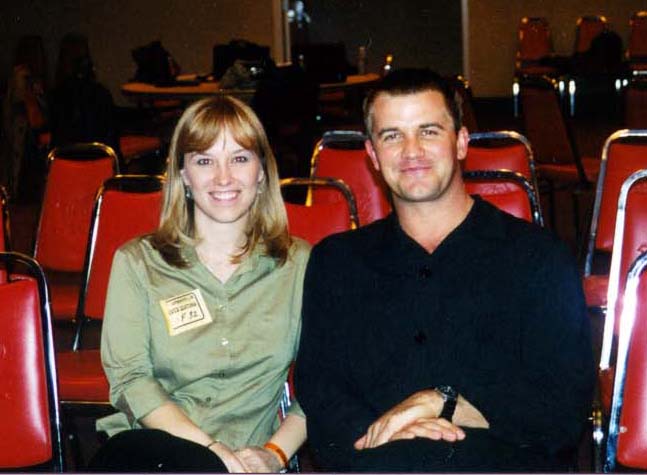
Back to my Jeremy Callaghan Page